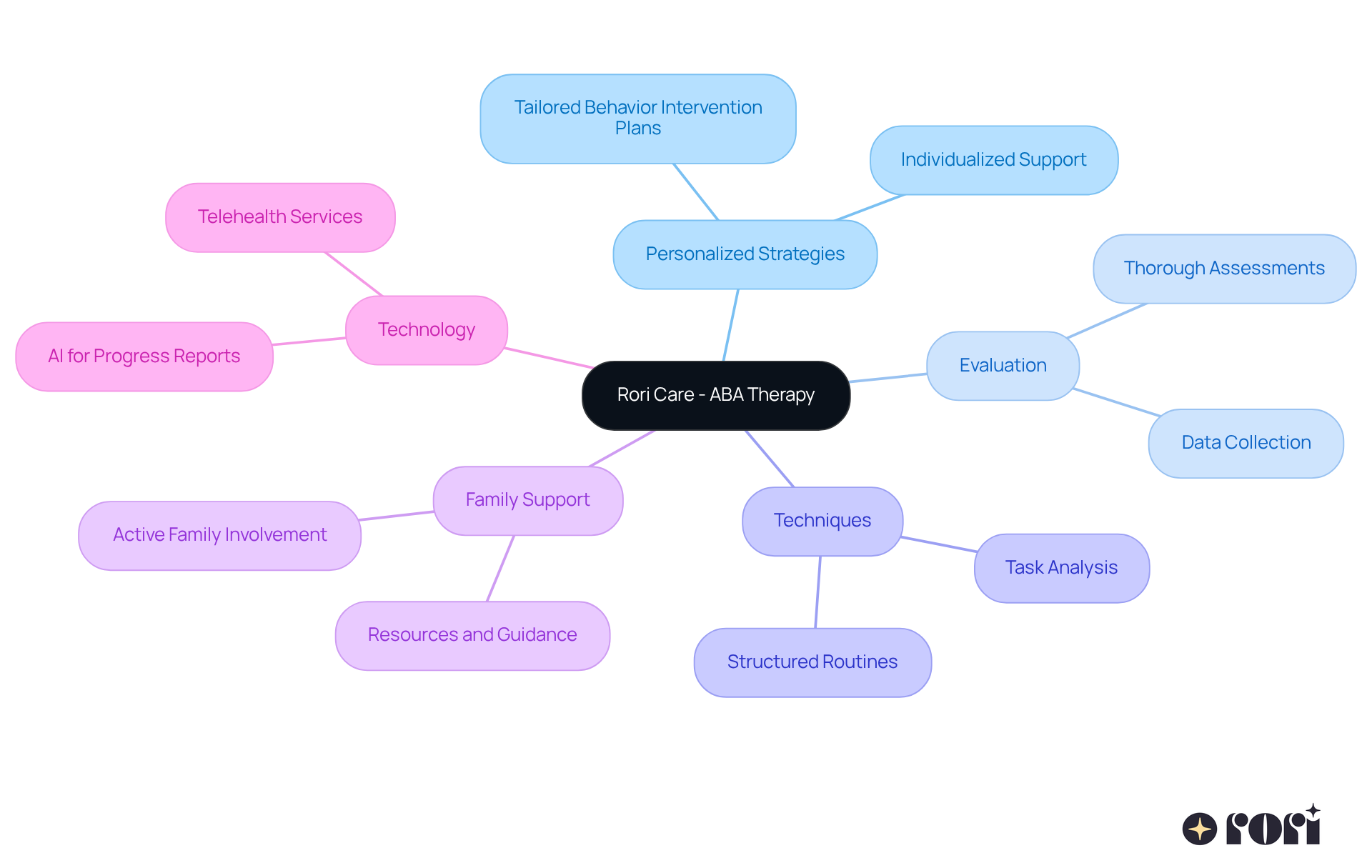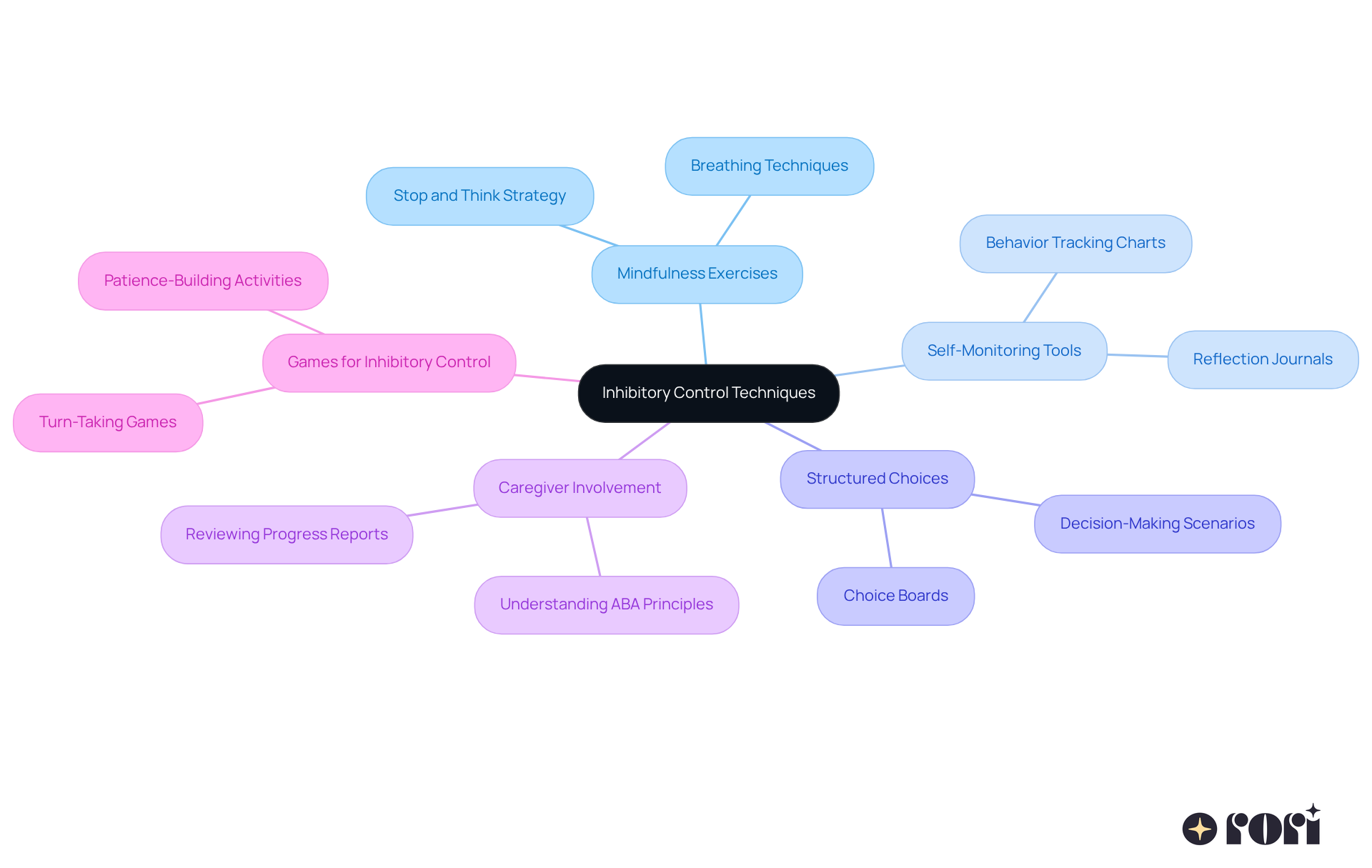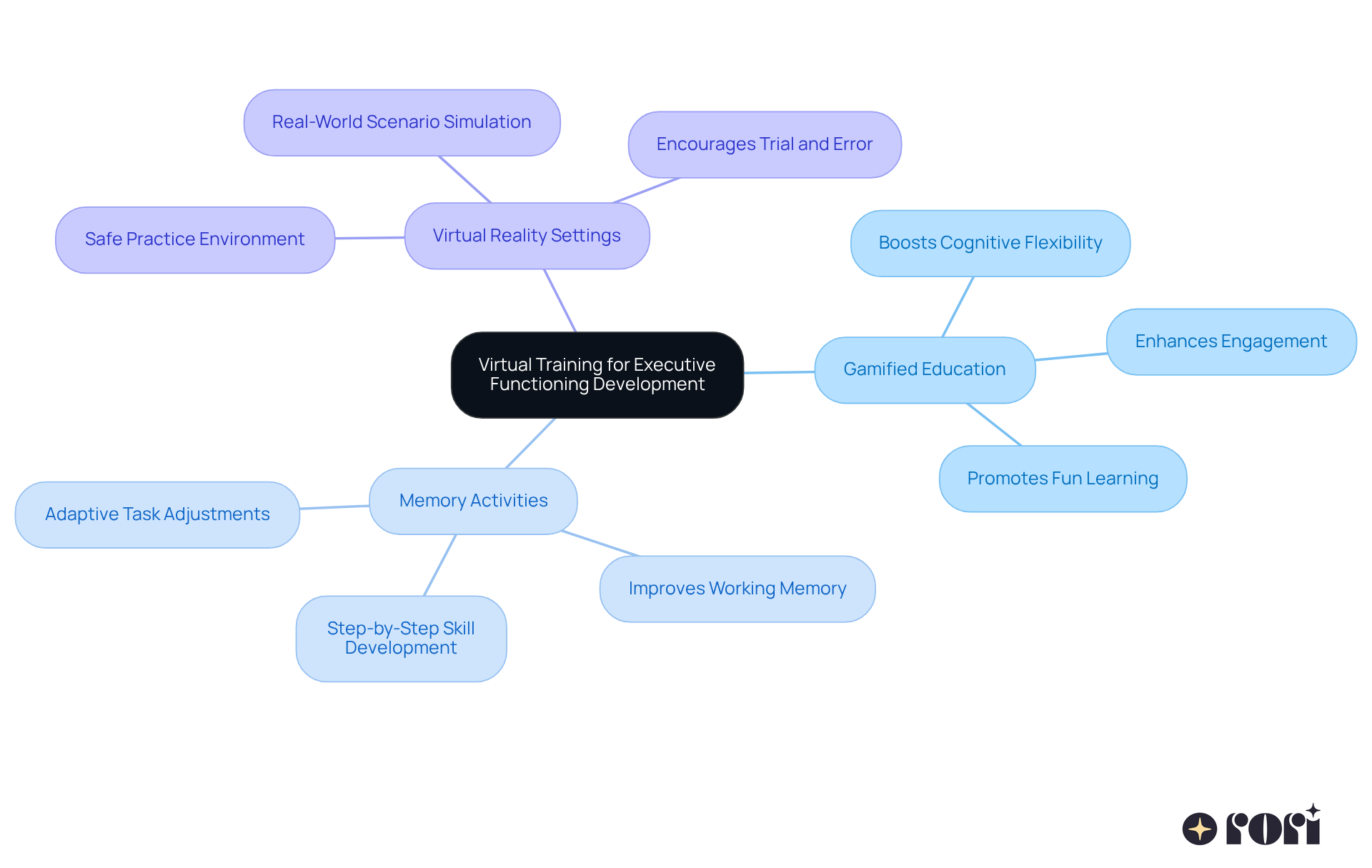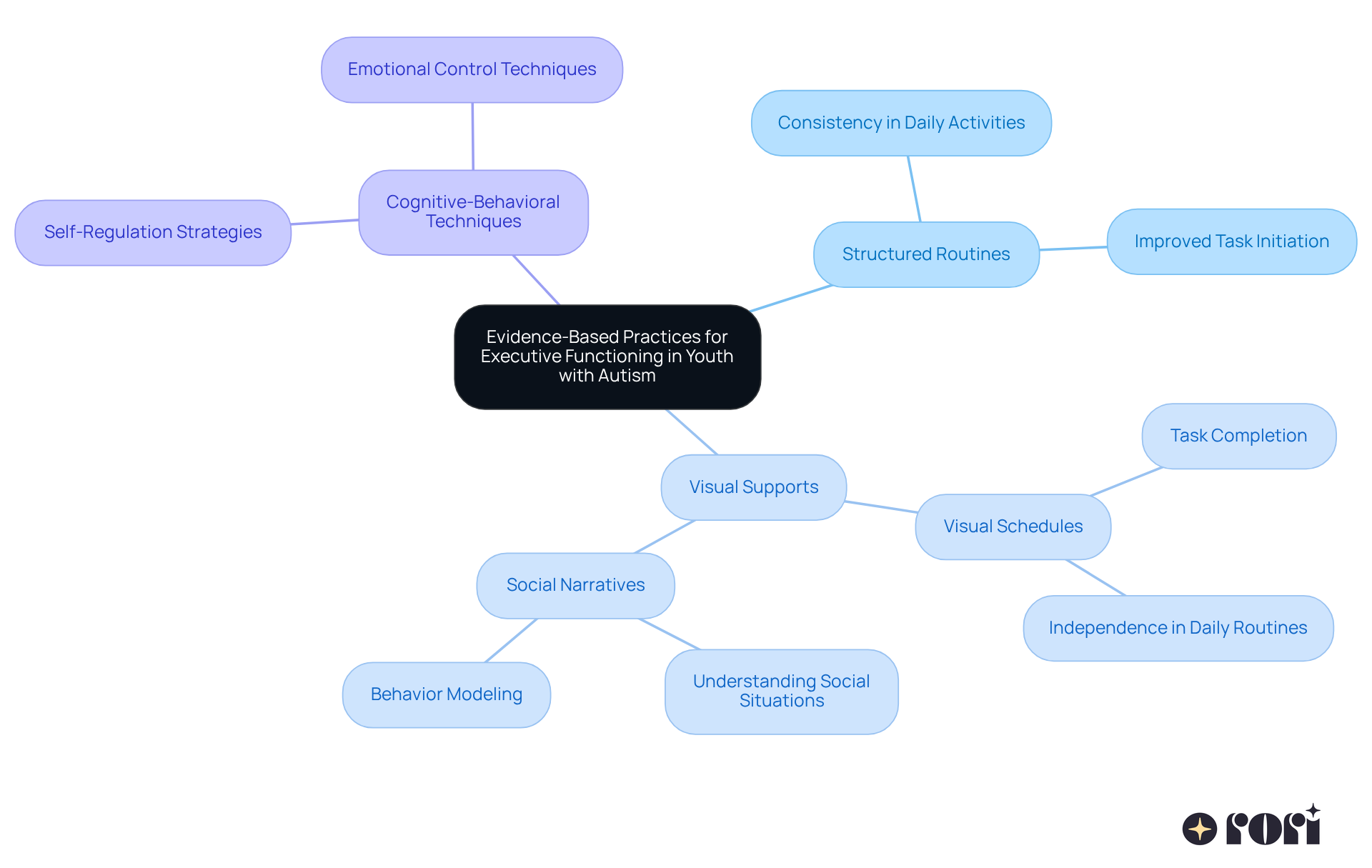Understanding and enhancing executive functioning in children with Autism Spectrum Disorder (ASD) is a complex yet crucial endeavor that can truly make a difference in their daily lives. 🌟 This article dives into ten effective approaches designed to promote these essential skills, offering parents and caregivers valuable insights into tailored strategies that can foster independence and resilience.
But with so many techniques out there, how can families find the best ways to support their child's unique needs? 🤔 Let’s explore these innovative strategies together! Not only will they illuminate the path toward improved cognitive abilities, but they’ll also empower families to take an active role in their child's development. We’re here to help you every step of the way!
At Rori Care, we understand that every child is unique, and that’s why we take a data-driven approach in our ABA therapy. We focus on personalized strategies that cater to each child’s specific needs. Our clinicians conduct thorough evaluations to identify executive challenges, which enables us to implement effective approaches for promoting executive functioning in children with ASD through tailored behavior intervention plans designed by qualified analysts.
We incorporate techniques like task analysis, breaking down complex tasks into manageable steps, along with structured routines that fit seamlessly into therapy sessions. These methods serve as effective approaches for promoting executive functioning in children with ASD by enhancing essential skills like planning and organization while also boosting self-regulation. By promoting independence, we equip young individuals with the tools they need to tackle daily challenges, ultimately improving their overall functioning and quality of life.
But it doesn’t stop there! We believe in empowering families too. Our compassionate support provides resources and guidance, helping you actively participate in your child’s development. And here’s something exciting: our creative use of AI technology automates progress report creation, giving you 50% more time for direct treatment. This means your child receives the focused attention they need to truly thrive.
Let’s explore this journey together! We’re here to help you every step of the way!

Visual supports like schedules, checklists, and graphic organizers are truly essential as effective approaches for promoting executive functioning in children with ASD, helping them manage tasks and understand what’s expected of them. These tools turn abstract concepts into something concrete, making daily routines and instructions much easier to navigate. For example, visual schedules can help young learners anticipate changes throughout the day, which can really cut down on anxiety and boost their ability to start tasks.
Did you know that many autistic individuals are visual learners? This makes visual supports especially effective in both educational and therapeutic settings. When these aids are part of a personalized plan crafted by a certified behavior analyst, they can be tailored to meet each person’s unique needs. This personalized approach not only highlights clear goals and ensures ongoing assessment but also incorporates effective approaches for promoting executive functioning in children with ASD, as the use of visual aids enhances understanding and encourages positive behavior changes and learning.
Let’s explore this together! If you’re a parent navigating these challenges, remember that you’re not alone. We’re here to help you every step of the way!

Cognitive flexibility training is considered one of the effective approaches for promoting executive functioning in children with ASD by helping them adapt to changes and think more flexibly. You know, it can be tough for them to adjust, but research shows that role-playing and problem-solving activities can really make a difference. For example, a meta-analysis found a small to moderate effect size for cognitive flexibility challenges in autistic individuals, highlighting just how important targeted interventions can be.
One effective technique is to introduce small changes to familiar routines. This way, kids can gradually build their adaptability skills without feeling overwhelmed. It’s a gentle approach that not only boosts cognitive flexibility but also helps with emotional regulation and resilience. Imagine how much easier it would be for them to tackle challenges when they feel more prepared!
Psychologists like Saeid Sadeghi emphasize that adaptability is key in the context of effective approaches for promoting executive functioning in children with ASD. It helps kids respond effectively to life’s unpredictability. Engaging in role-playing activities can further strengthen these skills, giving youngsters practical experiences that encourage flexibility and problem-solving in real-world situations.
And let’s not forget about technology! Incorporating tools like robots can offer fun and innovative ways to enhance cognitive flexibility, making learning more engaging and effective. By empowering caregivers with ABA principles and strategies, Rori Care ensures families are well-equipped to support their children’s developmental goals. Together, we can create a consistent and supportive environment that maximizes the impact of these interventions. Let’s explore this journey together!

Inhibitory control techniques are among the effective approaches for promoting executive functioning in children with ASD, as they focus on helping young people learn to manage their impulses and responses. Think about it: effective approaches for promoting executive functioning in children with ASD, including strategies like mindfulness exercises, self-monitoring tools, and structured choices, can really boost a child's ability to pause and think before they act. For instance, teaching kids effective approaches for promoting executive functioning in children with ASD, such as using a 'stop and think' strategy before reacting, can significantly improve their self-regulation skills.
And let’s not forget about the fun side! Games that require turn-taking and patience provide great opportunities for kids to develop inhibitory control while having a blast. Active involvement from caregivers is key to utilizing effective approaches for promoting executive functioning in children with ASD. When caregivers understand ABA principles, they can apply effective approaches for promoting executive functioning in children with ASD at home, creating consistency and better behavioral outcomes.
By teaming up with experts and using progress reports, caregivers can tweak their methods to meet their child's changing needs. This informed decision-making really empowers caregivers to support their child's growth effectively. So, why not set aside some time each week to review progress reports and adjust strategies? It’s a proactive way to nurture your child’s development. Let’s explore this together!

Improving working memory in individuals with ASD can feel like a daunting task for many parents. But don’t worry! Implementing effective approaches for promoting executive functioning in children with ASD can really help your child retain and recall information. For example:
These strategies can significantly boost a young person's working memory capacity.
Imagine breaking down complex instructions into manageable steps. Not only does this aid in retention, but it also makes task execution smoother. Using effective approaches for promoting executive functioning in children with ASD, such as visual supports like charts and checklists combined with repetitive learning tasks, can strengthen memory retention and make it easier for your child to recall information when they need it.
Research shows that mnemonic techniques, such as rhymes and acronyms, can enhance long-term memory retention. This provides young individuals with effective approaches for promoting executive functioning in children with ASD, enabling them to handle daily tasks more efficiently. Plus, memory games - think playing cards or storytelling relays - can make improving cognitive functions related to memory fun and interactive!
As Delima Tuesday Siagian points out, using mnemonic devices has proven beneficial in enhancing learning and reinforcing long-term memory. This highlights their importance in supporting individuals with ASD. So, let’s explore this together! We’re here to help you every step of the way!

Parental engagement is considered one of the effective approaches for promoting executive functioning in children with ASD. By setting up structured routines, parents can implement effective approaches for promoting executive functioning in children with ASD, which helps their little ones plan, organize, and self-regulate. For example, when kids help prepare family events, they not only sharpen their organizational skills but also strengthen their decision-making abilities. Using visual aids and checklists can further support them, making expectations clear and reinforcing task completion.
Another great strategy is modeling executive functioning skills. Parents can demonstrate how to break tasks into smaller, manageable steps, guiding their kids through homework or chores. Plus, engaging in fun activities like puzzles and board games can enhance cognitive flexibility and problem-solving skills, turning learning into an enjoyable experience.
Research shows that structured routines are one of the effective approaches for promoting executive functioning in children with ASD. Kids with consistent routines often exhibit effective approaches for promoting executive functioning in children with ASD, resulting in better self-regulation and lower levels of externalizing behaviors. Family therapists emphasize that equipping parents with effective approaches for promoting executive functioning in children with ASD can lead to lasting benefits in their children's academic and social success. By fostering a supportive atmosphere and getting involved in their kids' education, parents can help develop strong cognitive skills that will benefit their children throughout their lives.
Let’s explore this together! Remember, you’re not alone in this journey. We’re here to help you every step of the way!

Cooperation among specialists like Board Certified Behavior Analysts (BCBAs), occupational therapists, and speech-language pathologists is so important for helping kids with autism improve their cognitive skills. BCBAs are key players here, crafting individualized treatment plans that focus on reinforcing positive behaviors while tackling specific challenges. Meanwhile, occupational therapists bring in sensory techniques to boost concentration and attention - essential for enhancing cognitive abilities. For instance, sensory integration methods can really help kids manage sensory overload, leading to better focus and engagement in activities.
And let’s not forget about speech-language pathologists! They work on communication skills that enhance social interactions, which is crucial for developing higher cognitive processes. Regular chats between parents and these professionals are vital. They ensure that interventions stay consistent and effective. This teamwork not only boosts a child's potential for success but also empowers families by providing them with the resources and strategies they need to strengthen skills at home.
Research shows that effective collaboration among these professionals leads to better outcomes. When families actively participate in the therapy process, it enhances both satisfaction and therapeutic results. So, let’s explore this together! We’re here to help you every step of the way!

Play therapy offers effective approaches for promoting executive functioning in children with ASD by boosting their skills through fun and interactive activities, especially when paired with Applied Behavior Analysis (ABA) therapy. Think about games that involve turn-taking, problem-solving, and adaptability - these can really enhance cognitive skills while creating a joyful learning environment. For instance, board games or role-playing scenarios encourage kids to practice planning, organization, and social skills, which are key components of ABA therapy.
It’s pretty impressive that 90% of kids show progress when they engage in the recommended hours of ABA therapy, especially with active involvement from caregivers. Plus, did you know that ABA therapy is the only scientifically backed treatment for autism that insurance covers? Integrating movement-based games is one of the effective approaches for promoting executive functioning in children with ASD, as it helps kids with self-regulation and focus, making play therapy a fantastic way to nurture cognitive skills.
By using effective approaches for promoting executive functioning in children with ASD within play therapy, caregivers can really support their child’s growth, ensuring that the therapy meets each child’s unique needs. Let’s explore this together! If you have any thoughts or experiences to share, we’d love to hear from you!

Virtual training platforms are changing the game by providing effective approaches for promoting executive functioning in children with ASD! 🌟 These programs use interactive and engaging methods, like gamified education and memory activities, to make learning fun and effective. For instance, there are apps designed specifically for working memory training that adjust tasks based on each person's unique abilities, helping them improve step by step.
Imagine this: virtual reality settings that mimic real-world situations! This allows young individuals to practice their executive functioning skills in a safe and controlled environment. It’s not just about learning; it’s about equipping them with the tools they need to tackle real-life challenges confidently. Studies have shown that gamified education is one of the effective approaches for promoting executive functioning in children with ASD, as it can significantly boost cognitive flexibility and nurture essential skills.
Experts in technology are on board too! They highlight how these interactive platforms can significantly enhance motivation and engagement, leading to better educational outcomes. By weaving gamified learning applications into daily routines, parents can create enriching experiences that support their children's cognitive development. Let’s explore this together! We’re here to help you every step of the way!

Enhancing executive functioning abilities in youth with autism is crucial, and implementing effective approaches for promoting executive functioning in children with ASD can make a significant difference! Think about strategies like:
These approaches have shown positive outcomes. For example, using visual schedules can really help kids get started on tasks and see them through to completion. Plus, cognitive-behavioral techniques can boost self-regulation and emotional control.
Now, let’s talk about how caregivers can get involved. By understanding and applying ABA principles - like reinforcement strategies and data collection methods - parents can actively engage in their child’s development. This creates a consistent and supportive environment that’s so beneficial! Not only does this involvement complement professional interventions, but it also empowers caregivers to make informed decisions that positively impact their child's progress.
By integrating these proven strategies into therapy and daily routines, parents and professionals can collaborate on effective approaches for promoting executive functioning in children with ASD. Let’s explore this journey together! We’re here to help you every step of the way!

Promoting executive functioning in children with Autism Spectrum Disorder (ASD) is no small feat, and it really calls for a multifaceted approach that respects each child's unique journey. By using effective strategies like personalized ABA therapy, visual supports, cognitive flexibility training, and involving parents, caregivers and professionals can truly boost a child's ability to plan, organize, and self-regulate. These methods not only support cognitive growth but also help children with ASD feel more independent and confident.
Throughout this article, we've explored various techniques that can make a difference. For instance:
Plus, the collaboration among professionals and the active involvement of families in their child's learning journey is absolutely vital. Each of these elements creates a nurturing environment where children can really thrive.
As we wrap up, remember that enhancing executive functioning in children with ASD is a journey that requires patience, dedication, and a willingness to explore different strategies. By harnessing evidence-based practices and embracing innovative tools, families and professionals can team up to equip children with the skills they need to tackle daily challenges. This commitment to fostering essential skills not only improves the quality of life for children with ASD but also empowers families to take an active role in their development. Let’s explore this together!
What is Rori Care's approach to ABA therapy for children with ASD?
Rori Care uses a data-driven approach in ABA therapy, focusing on personalized strategies tailored to each child's unique needs. Clinicians conduct thorough evaluations to identify executive challenges and implement effective behavior intervention plans designed by qualified analysts.
How does Rori Care promote executive functioning in children with ASD?
Rori Care promotes executive functioning through techniques like task analysis, which breaks down complex tasks into manageable steps, and structured routines. These methods enhance skills such as planning, organization, and self-regulation, ultimately improving children's independence and quality of life.
What role do families play in the therapy process at Rori Care?
Rori Care empowers families by providing resources and guidance to help them actively participate in their child's development. The support offered ensures that families are involved and informed throughout the therapeutic journey.
How does Rori Care utilize technology in their therapy?
Rori Care creatively uses AI technology to automate progress report creation, allowing clinicians to spend 50% more time on direct treatment, which enhances the focused attention children receive during therapy.
What are visual supports and how do they help children with ASD?
Visual supports, such as schedules, checklists, and graphic organizers, help children manage tasks and understand expectations. They turn abstract concepts into concrete tools, making daily routines easier to navigate and reducing anxiety.
Why are visual supports particularly effective for autistic individuals?
Many autistic individuals are visual learners, making visual supports especially beneficial in educational and therapeutic settings. When tailored by a certified behavior analyst, these aids can enhance understanding and promote positive behavior changes.
What is cognitive flexibility training and why is it important?
Cognitive flexibility training helps children with ASD adapt to changes and think more flexibly. It is important because it enables children to respond effectively to life's unpredictability and enhances their emotional regulation and resilience.
What techniques are used in cognitive flexibility training?
Techniques include introducing small changes to familiar routines and engaging in role-playing and problem-solving activities. These methods gradually build adaptability skills and strengthen cognitive flexibility.
How can technology be integrated into cognitive flexibility training?
Incorporating tools like robots can make learning more engaging and effective, providing fun ways to enhance cognitive flexibility for children with ASD.
How does Rori Care support caregivers in the therapy process?
Rori Care equips caregivers with ABA principles and strategies, ensuring they are well-prepared to support their children's developmental goals and create a consistent, supportive environment.